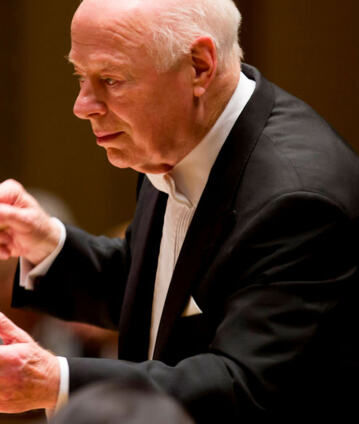Bernard Haitink conducts Mahler’s Seventh Symphony

Gustav Mahler’s Seventh Symphony is characterised by a mysterious and romantic mood, with the second and fourth movements bearing the designation “Nachtmusik”. The finale, however, is one of the composer’s brightest and most optimistic conceptions. Alongside Claudio Abbado and Sir Simon Rattle, Bernard Haitink has been the defining Mahler conductor in Berliner Philharmoniker concerts in recent decades. His performance of the Seventh was given 1992 during an entire series of performances of Mahler’s symphonies.
Gustav Mahler was strongly influenced by the legacy of Romanticism. One of its favourite themes is the night: as a realm of dreams, fantasy and mystery. The epithet “Lied der Nacht” (Song of the Night) was not given to Mahler’s Seventh Symphony by the composer himself – but the darkened sound of the beginning and the rhythm of a funeral march suggest this association. Moreover, movements two and four are designated “Nachtmusik”.
At first, Mahler found it unusually difficult to work on the symphony. His creative crisis finally came to an end during a stay at Lake Wörth in the south of Austria. The connection to nature is particularly striking in this work – in its imitations of bird calls, its pastoral atmosphere, and the sound of cowbells. Its structure is unusual: like Beethoven’s Pastoral and Schumann’s Rhenish, the work has five movements instead of the usual four. As a result, the outer movements and the two Nachtmusiken symmetrically frame a short scherzo in the middle. The sombre mood of the first movement lightens in an abruptly inserted episode, which the composer himself described as a glimpse of a “better world”. The rondo finale, on the other hand, is characterised throughout by an unusually optimistic tone, despite the surprising return of the opening motif.
Bernard Haitink has earned a reputation as one of the leading Mahler interpreters of our time. He approached the composer’s music with much patience and stamina, which was characteristic of him. He turned down an offer from a record company to record a complete Mahler cycle within two years, and, as chief conductor of the Royal Concertgebouw Orchestra, performed only one of the composer’s symphonies each season. Apart from the chief conductors Claudio Abbado and Sir Simon Rattle, only Bernard Haitink has performed all nine of Mahler’s completed symphonies with the Berliner Philharmoniker since the 1990s. The concert series is available in its entirety in the Digital Concert Hall.
© 1992 EuroArts Music International, brilliant media, SFB in association with Philips Classics
Artists
Our recommendations
- 1993 Europakonzert from London with Bernard Haitink and Frank Peter Zimmermann
- Bernard Haitink conducts Mahler’s Seventh Symphony
- Bernard Haitink conducts Beethoven and Wagner
- Bernard Haitink conducts Mahler’s First Symphony
- Brahms’s Violin Concerto with Frank Peter Zimmermann and Bernard Haitink
- Bernard Haitink conducts Mahler’s Ninth Symphony